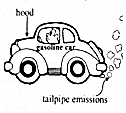To go for a party, Sally is choosing suitable shoes to (go well with) her new silk dress in the shopping mall.
Do you have difficulty learning English words?Well,(1)k a vocabulary notebook for learning new English words is not difficult.Here are some easy steps.First,buy a notebook (2)w at least 100 lined pages.You should select the color and size notebook that you prefer.(3)S , write down any important words that you come across when reading or listening.This step (4)r you to decide whether a word is important enough for you to learn now.Do not assume(认为) that you will learn the word (5)l .The next step is a bit difficult because you need to decide (6)w information about each word you will write in the notebook.
Some learners write only a(7)t of the word.Others write an example pharse using the word.I(8) information that matches your learning style and your needs.Finally,the most important thing you can do to learn the words in your notebook is to(9)p these words several times.If the pages of your notebook are well organized, you are more likely to review the words and their information over and over.If you (10)f these important steps, you can improve your English greatly.Come and have a try!

Cars powered by gasoline were sold for many years before hybrid vehicles that use gasoline, electricity, and solar energy.Car companies are now making cars that are fully powered by electricity only.How do these electric cars measure up to(符合标准) traditional gasoline cars?
Electric and gasoline vehicles look similar on the outside.They have very different parts under their hoods,though. Electric cars have one main moving part:the motor.But gas cars literally have hundreds of parts,often requiring frequent maintenance(保养).Having fewer parts makes the electric car cheaper to maintain and less likely to have mechanical problems.
Electric vehicles are energy efficient,also making them cheaper to operate.It costs about $ 1.00 to travel 43 miles in an electric car,which is a clear contrast to a gas car, which costs about $1.25 to go 18 miles.Basically, an electric car can go twice as far as a gas car for the same price.
Electric vehicles do not have tailpipe emissions ,making them more friendly to the environment, too.
While some details make electric cars seem attractive, other details aren't as favorable.For example,some electric cars can travel only 60 to 120 miles on a full charge(充电).Most gas cars can drive hundreds of miles on a full tank.
An electric car has to stop more often to get recharged.Therefore,a gas car would be a better option(选择)if you have far to drive.And electric cars aren't as convenient(方便的) to power up as gas cars are.There are plenty of gas stations, but not many charging stations for electric cars.Then, once an electric car reaches a charging station, it can take up to six hours to charge.
There are certainly benefits to both electric cars and gasoline cars.It’s good to know that there is an option.
|
Electric cars vs Gasoline cars |
|
|
Introduction |
With the appearance of electric cars, people wonder whether electric cars can achieve the(1) standards as gasoline cars. |
|
Similarity |
Electric cars and gasoline cars looks similar on the outside. |
|
(2) Differences |
Electric cars ●Having fewer parts reduces the(3) of their maintenance and the(4) of having mechanical problems. ●(5) with gasoline cars, electric cars are more energy﹣saving,making them cheaper to operate. ●Having no tailpipe emissions, they are more environmentally(6) . ●It(7) more time for electric cars to get charged. Gasoline cars ●Gas cars can cover a(8) distance on a full tank than electric cars on a full charge. ●Gas cars are more(9) to power up. |
|
Conclusion |
Both electric cars and gasoline cars have their own benefits,which provides people with a(10) . |

|
sell; next month; musical ability; raise money; How about |
John:Where have you been?You missed the announcement about the music festival.
Frank:I was at the teacher's office.Music festival?
John:Yes, it's going to be(1) in the school hall.Frank,you can play the violin.(2) playing it at the festival?
Frank:Well, I’d rather play the piano.I can play Mojito, What about you,John?
John:Actually.I don’t have much(3) .I’d prefer just to do some voluntary work.I can(4) tickets.
Frank:So can I guess that the aim of the festival is to(5) ?
John:Yes.All of the money will go to charity.
Frank:Well, if it's for a good cause, everyone should take part!

China has (rapid) become a world leader in high speed rail.Journeys that took days now take hours.